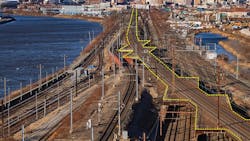Amtrak begins procurement process for Sawtooth Bridges Replacement Project
Amtrak, in coordination with New Jersey Transit (NJ Transit), has begun the procurement process for the Sawtooth Bridges Replacement Project. Replacement of the Sawtooth Bridges is a key component of the Gateway Program to preserve and expand the busiest section of the Northeast Corridor (NEC).
The Federal Railroad Administration (FRA) recently awarded the project up to $133.32 million in grant funding to support early construction activities, along with 24 other projects totaling more than $16.4 billion of federal investment across the NEC. The work will modernize and expand 1.9 miles of the NEC in Kearny, NJ., built in 1907.
“The Federal Railroad Administration is pleased to see progress being made on the new Sawtooth Bridges and we’re proud to support a project that will eliminate a major bottleneck on America’s busiest rail corridor. Replacing and expanding the Sawtooth Bridges is one of nearly 220 FRA-funded rail projects moving forward since the start of the Biden-Harris Administration. Through President Biden’s Investing in America agenda, we’re going to advance several more projects of national significance along the NEC, notably through $16.4 billion in new NEC grants announced earlier this month that will modernize NEC infrastructure and help deliver world-class passenger rail to more Americans,” said FRA Administrator Amit Bose.
“Building the new Sawtooth Bridges requires significant coordination with our partners at NJ Transit, PATH and Conrail and we are grateful for their shared commitment to modernize and bring this critical stretch of the NEC to a state of good repair,” said Amtrak CEO Stephen Gardner. “We appreciate the Biden Administration, [New Jersey] Gov. [Phil] Murphy and Congress for providing and helping to unlock the Infrastructure Investment and Jobs Act funding that makes this work possible.”
Owned by Amtrak, the Sawtooth Bridges carry more than 400 Amtrak and NJ Transit trains per day over tracks used by NJ Transit, PATH and Conrail freight trains. When complete, the new four-track NEC structure will double track capacity in one of the most congested and complex locations on the NEC, where these different services all come together. The age and current condition of the Sawtooth Bridges also restrict trains to speeds of 60 mph.
The procurement process has officially begun with the publication of Advance Notices on Amtrak’s Procurement Portal. Amtrak intends to use the innovative CMAR approach to deliver the project and expects to issue two Requests for Qualifications in the near future – one for the CMAR contract and another for the project, program and construction management contract. A formal Request for Proposals will follow in 2024.
This work will be performed under a Project Labor Agreement as part of a 2021 Memorandum of Understanding between Amtrak and North America’s Building Trades Unions covering Amtrak’s major civil engineering projects.
The Sawtooth Bridges Replacement Project is one of several major infrastructure projects being planned and delivered by Amtrak’s Capital Delivery organization under the leadership of Executive Vice President, Capital Delivery Laura Mason. In September, Amtrak awarded its first CMAR contract to advance construction for the Frederick Douglass Tunnel Program in Maryland. Active procurements are also underway for the East River Tunnel Rehabilitation Project, Connecticut River Bridge Project, major fleet facility upgrades and more. Additional procurement opportunities for other projects will be announced over the next several months.
“NJ Transit’s collaboration with Amtrak on the Sawtooth Bridges Replacement Project is a key component in advancing the overall Gateway Program. Together with NJ Transit’s Portal North Bridge Replacement Project, we are eliminating century-old bottlenecks in the busiest section of the Northeast Corridor. We look forward to working with our partners at Amtrak to continue to improve the reliability and customer experience for New Jersey commuters,” said NJ Transit President and CEO and Co-chair of the NEC Commission Kevin S. Corbett.
